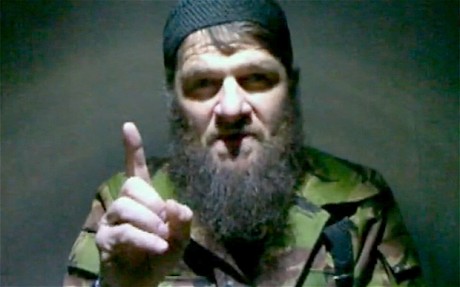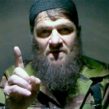
North Caucasus Rebel Leader Tries to Capitalize on Russian Anti-Kremlin Protests
Publication: Eurasia Daily Monitor Volume: 9 Issue: 28
By:

The leadership of the North Caucasian militants is attempting to capitalize on the rising tensions in Russian society. As popular protests against the return of Prime Minister Vladimir Putin to the Russian presidency spread, the leader of the North Caucasian armed resistance, Doku Umarov, tried to use the situation to his own advantage, declaring a moratorium on operations targeting Russian civilians. Umarov made the declaration in a video recorded against the backdrop of a snow-covered forest and in the presence of two of his aides (https://af.reuters.com, www.rferl.org, February 3).
It is evident that the targeting of civilians was one of the main contentious issues in the row between Umarov – who supported targeting civilians – and the Chechen rebel commanders who revolted against him – considering civilians off limits – and proclaimed Khusein Gakaev as their new leader in August 2010 (www.kommersant.ru, October 10, 2010). One year later, when they reunited under Umarov’s command, it was clear that the leader of the North Caucasian militants would have to make some concessions in return for their reaffirmation of allegiance, especially as a Sharia-based examination of the dispute reconfirmed that the dissenters were right on political grounds, but that they contradicted Sharia (www.youtube.com/watch?v=VkRcpfchSU8). This vague finding allowed both sides of the dispute to save face. The dissenters did not like the fact that Umarov took responsibility for all the terrorist attacks across the Russian Federation. The Sharia-based examination of the dispute was performed by the principal Sharia qadi (judge) of the Caucasus Emirate, Sheikh Abu Mukhammad of Dagestan. This was further circumstantial proof of the unified structure of the Caucasus Emirate that some North Caucasus experts fail to recognize.
The principal website of the North Caucasian resistance movement, Kavkaz Center, tried to depict Umarov’s decision as virtually the most revolutionary and progressive of the past several years. In fact, it was actually simply a self-promotional statement designed to change the image of the resistance. Since 2007, the resistance movement in the North Caucasus under Doku Umarov has been entirely associated with Islamic radicalism. Although Umarov is inarguably the leader of all the jamaats of the North Caucasus, it is hardly possible he can exercise control over all operations of the militants, especially those outside the region. Thus, hasty statements by experts about the possible complete overhaul of the North Caucasus resistance movement should be considered premature (https://avrom-caucasus.livejournal.com/155534.html).
In explaining his decision to change the status of the civilian population of Russia, Umarov stated that by opposing Vladimir Putin, the population of Russia was also condemning the government’s actions against the North Caucasus (www.kavkaz-uzel.ru/articles/200452/). Umarov may also have intended to signal to the West his willingness to alter the militants’ policies. Indeed, it is hard to believe that Umarov seriously thinks that the Russian opposition will come to power in the country. So far, the opposition’s challenge to Vladimir Putin’s rule has entailed little apart from mass demonstrations in the Russian capital.
Most likely, we are now seeing a battle of ideas between the rebels and the government. The militants are trying to impress the general public with their numbers, asserting they have thousands and thousands of rebels in their ranks, while the government tries to downplay the rebels’ numbers. Chechen leader Ramzan Kadyrov regularly states that there are only 50 rebels in Chechnya. In Dagestan, the republican government says there are 300 rebels organized into 12 groups scattered across the republic, allegedly concentrated in five districts – Derbent, Kizlyar, Sergokala, Untsukul and Tsumada. To contain these groups, the Dagestani government has set up five groups made up of police, the FSB (Federal Security Service) and Interior Ministry troops. At a government meeting on law enforcement and security, the head of Dagestan, Magomedsalam Magomedov, stated that the numbers of troops in the republic had been increased over the previous several months. The increase was achieved using Dagestan’s own forces and forces from other regions of Russia (www.kommersant.ru/doc/1866365). Moreover, the authorities intend to pump even more troops into Dagestan, utilizing both local and the manpower resources of other Russian regions.
Dagestan’s governor failed to explain why such a high concentration of military, police and FSB personnel is needed to fight such a small group of rebels. If every group is comprised of 25 people and the total number of groups is 12, then it is hard to understand why 20,000 police officers and several thousand members of the interior and defense ministries, border guards and FSB troops are insufficient to cope with the insurgents. The ratio of the law enforcement officers to rebels would be 66 to 1 in Dagestan, while in Chechnya, the same ratio is 250 to 1.
Against the background of the increased number of operational groups in Dagestan, Ramzan Kadyrov stated that he had reached an agreement with the neighboring republics of Ingushetia and Dagestan to launch joint operations against militants (www.kavkaz-uzel.ru/articles/200451/?print=true). The ability to carry out special operations in the neighboring republics has been an old dream of the Chechen authorities. Most likely this agreement was reached after Vladimir Putin’s visit to Kislovodsk on January 23, where the Prime Minister spoke to all of the North Caucasian leaders (www.stapravda.ru/20120123/vladimir_putin_posetil_forum_narodov_yuga_rossii_v_kislovodske_58238.html). However, the very first joint operation in the border area between the Chechen Republic and Dagestan, which was carried out under the command of Chechen security officials Vakhit Usmaev and Alibek Delimkhanov, was unsuccessful. Usmaev is commander of the Chechen Interior Ministry’s Akhmad Kadyrov regiment, while Delimkhanov is commander of the Sever battalion, a part of the Russian Interior Ministry’s troops (https://moidagestan.ru/news/antiterror/13010). Thus the most capable, elite units of the Chechen troops were sent to find four suspected rebels, in an apparent attempt to showcase the cooperative arrangement between Chechnya and Dagestan. However, the rebels disappeared and the troops withdrew back to their bases.
Thus, the authorities so far have been indulging in serving their own interests and in wishful thinking. The figures and overtones of the government’s statements give reason to assume that the authorities are on the defensive on all fronts.




